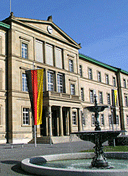The first of four centres for Islamic theology was officially opened last week at the University of Tübingen in southern Germany. All four will begin teaching later this year.
 At Tübingen, the first 36 students have already enrolled for a bachelor degree in Islamic theology, starting next winter.
At Tübingen, the first 36 students have already enrolled for a bachelor degree in Islamic theology, starting next winter.
Like two others, one split between Münster and Osnabrück and the other between Frankfurt and Giessen, which are to be officially opened later this year, the Tübingen centre started its academic activities last October. A fourth, located at Erlangen and Nuremberg, will officially start in the winter semester of 2012-13.
The federal Ministry of Education and Research (BMBF) will be providing a total of around EUR20 million (US$26 million) to support the scheme.
The federal government decided four years ago to set up new centres for Islamic theology. A government commission reviewing the issue maintained that given the more than four million Muslims in Germany, such centres were urgently needed.
Up to 2,000 teachers are required for a total of 700,000 schoolchildren over the next few years. The new centres will train teachers for Islamic religious education, junior scholars of Islamic theology and religious scholars, also for mosques, as imams.
The BMBF is initially providing around EUR4 million for the Tübingen centre to fund university chairs, assistant staff and groups of junior scholars.
According to Tübingen’s rector, Bernd Engeler, the chief aim of the centre is to provide scholars with a broad-based education so that they can represent religious studies as an academic subject. Engeler regards training teachers who will eventually be teaching religion at higher secondary schools, or academics going on to careers in the media or various social service areas, as far more important than concentrating on imams.
“We wish to contribute the wealth of experience that we have gathered in theology at German universities to the development of Islamic theology,” Federal Education Minister Annette Schavan said at the opening ceremony in Tübingen on 16 January.
“I am sure that this is a milestone for integration, too.” The minister added that the centre offered a “great opportunity to promote dialogue with the Christian religions”.
The centre has been in operation for the past few months, pending its official inauguration by the minister.
Koranic scholar Omar Hamdan is the first professor appointed at Tübingen. Hamdan graduated in Islamic and Arabic studies in Jerusalem as well as comparative religion in Tübingen.
Leijla Demiri, from Macedonia, is to hold the chair of Islamic dogmatics from the winter semester of 2012-13. Demiri studied Islamic theology in Istanbul and Catholic theology in Rome, and subsequently did a PhD in comparative theology at the University of Cambridge.
Two junior professors are to teach Islamic law and the history and contemporary culture of Islam.
A seven-member Muslim advisory council is to support the process of institutionalising Islamic theology. The academic skills of the professors are tested solely by the University of Tübingen. The students comprise 23 women and 13 men, and come from all over the world.
via First of four centres to train Islamic scholars opens – University World News.